The crypto market is abuzz as the “Kimchi premium” returns, signalling heightened interest from South Korean investors. This term describes the higher prices that cryptocurrencies, particularly Bitcoin, command on South Korean exchanges over global averages. This price gap exemplifies the increasing investment fervor within the country, driven by investor fear of missing out (FOMO). At the same time, it underlines the impact of South Korea’s stringent regulations on its financial ecosystem. While the premium can indicate strong local demand, it also presents a challenge both for domestic investors looking to arbitrage and for the international community trying to understand South Korea’s distinct market dynamics. This peculiar phenomenon raises compelling questions about the country’s role and influence in the broader cryptocurrency sphere, especially as the nation grapples with regulatory measures that shape the flow and accessibility of these digital assets.
Unpacking the Kimchi Premium
The term ‘Kimchi premium’ is much more than a catchy moniker for cryptocurrency enthusiasts. It illustrates a serious imbalance in the demand-supply dynamics between the South Korean crypto market and the rest of the world. When the premium mushroomed to noticeable levels, it was speculated that South Korean investors were willing to pay more for their digital assets due to increased local demand. This demand is often attributed to retail investor sentiment, reflecting a significant level of FOMO.
This enthusiasm is hardly superficial, given past instances where this premium has surged. South Korea has been known to lead massive retail investor drives which push the premium even higher. Such times have historically aligned with periods of intense media coverage and public interest in cryptocurrencies. For the keen observer, the Kimchi premium is a direct pulse on retail investor sentiment in the country, signaling when local investors are diving headlong into the market, driven by a fear of being left out of potential gains.
The Challenges of Arbitrage
The Kimchi premium, a price difference for Bitcoin in South Korea compared to global rates, suggests an arbitrage chance. However, South Korea’s tough capital controls limit fund transfers, curbing this opportunity. These measures are meant to stabilize the financial system but also contribute to the premium’s persistence.
Setting up a bank account and explaining large sums to regulators in South Korea adds to the arbitrage challenge. Thus, despite its potential, the Kimchi premium often goes unexploited.
This price variance indicates strong local retail investor interest, perhaps due to FOMO. While it appears to offer arbitrage prospects, the combined reality of stringent regulations and operational hurdles keeps the premium as a consistent element of South Korea’s unique crypto market dynamics. The Kimchi premium highlights both the domestic enthusiasm for cryptocurrencies and the market’s somewhat isolated state.

